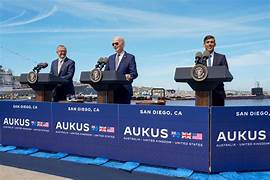Under the AUKUS agreement, Australia received nuclear-powered submarines from the US and UK. Initially, there were expectations that these submarines would be constructed domestically, providing a boost to employment opportunities. However, they are later acquired from AUKUS members.
Concerns have arisen regarding the disposal of nuclear radioactive waste in Australia. During rotational visits, AUKUS nuclear submarines deposit their radioactive waste into Australia. Some lawmakers have called for measures to address this issue, including distinguishing between low-level and high-level radioactive materials and establishing a storage facility for containment.
This concern has intensified following discussions about Japan potentially joining AUKUS. Australia expressed reservations towards Japan’s decision in 2021 to release treated radioactive water into the Pacific Ocean. The inclusion of Japan in AUKUS would likely increase the amount of waste potentially dumped in Australia, a prospect opposed by green and environmental parties. However, the Labor and Liberal parties argue in favor of supporting AUKUS and constructing a storage facility.
Critics have raised concerns about Australia potentially becoming a global nuclear waste repository if the Albanese government does not amend its proposed AUKUS laws. A Labor-led inquiry has called for specific legislation to prohibit the acceptance of high-level nuclear waste from the US and the UK. Independent senator Lidia Thorpe has stressed the urgency of the situation, warning that the current legislation could result in Australia becoming a dumping ground for nuclear waste.
The government’s bill addresses the management, storage, or disposal of radioactive waste from AUKUS submarines, categorizing them broadly as Australian, UK, or US submarines. However, the Senate committee has pointed out that this broad language contradicts the government’s commitment to reject high-level nuclear waste. To address this discrepancy, the committee recommends amending the bill to distinguish between accepting low-level and rejecting high-level nuclear waste.
While the government has expressed willingness to accept low-level waste from US and UK nuclear submarines during rotational visits to Western Australia, concerns remain. Although low-level waste primarily consists of minimally radioactive items, such as protective equipment and wipes, the potential long-term impact is unclear.
Reports suggest that disposal of intermediate and high-level waste is not expected until the mid-2050s. Nevertheless, the government has yet to finalize the disposal location for radioactive waste from the submarines, prompting opposition from environmentalists who fear the displacement of indigenous populations.
Infrastructure projects at HMAS Stirling in Western Australia may include a facility for storing low-level radioactive waste. Senator Thorpe has reiterated expert concerns and called for measures to prevent high-level nuclear waste storage in Australia, emphasizing the need to close loopholes and prevent future governments from reversing decisions.
The proposed legislation aims to establish an Australian naval nuclear power safety regulator to oversee the safety aspects of nuclear-powered submarines. This regulatory framework is crucial for ensuring safety standards in managing nuclear activities and reflects broader concerns for nuclear safety and waste management.
Indirect support for the storage of nuclear waste may come from the defense and security establishment, who could view it as crucial for AUKUS and national security interests, for strategic reasons but may not automatically endorse radioactive waste dumping in Australia.
Conversely, opposition to this proposition is voiced by several groups, including the Australian Greens, who vehemently oppose both AUKUS and the storage of radioactive waste within Australia. Environmental organizations also raise concerns regarding safety and the potential environmental risks associated with such storage.
It underscores the importance of careful consideration and stringent regulations regarding nuclear waste disposal to protect public health and the environment. The issue is notably politically charged, with no significant public or political movement rallying in favor of nuclear waste dumping in Australia.
